
Cybersecurity critical for DoD teleworkers during pandemic
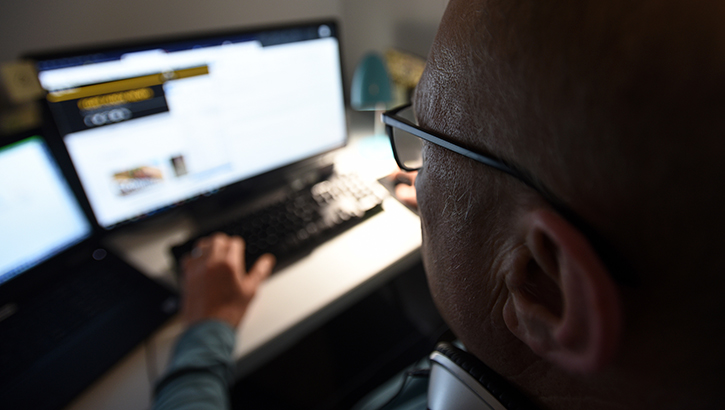
Telework made necessary by the COVID-19 pandemic has increased internet reliance and heightened the need for safe cybersecurity practices. (Photo by Eric Pilgrim)
The COVID-19 pandemic has amplified the importance of balancing our continued commitment to the military healthcare mission with our own personal hygiene and well-being. As a result, much of the Department of Defense workforce and their family members have taken to telework and online classes. With a high-volume of DoD network users and their families on the internet, we must balance the requirements of the military healthcare mission with that of protecting the network, computers and mobile devices - whether DoD or personal - by practicing good cyber hygiene just as we practice good personal hygiene.
“People expect to get information on their phones, at home, at work, in multiple ways,” said Servio Medina, one of the Defense Health Agency’s health information technology’s leaders on cybersecurity. “When you increase the venues of access, you could increase the likelihood of risk and unauthorized access.”
That’s why the Military Health System is increasing its efforts for cybersecurity awareness and “healthy” practice. Medina said it’s more important than ever to protect information, especially someone’s personal health information. Protect your family in cyberspace by discussing safe online behavior with them. To help with this discussion, the DHA offers www.Health.mil/cyberfit: plain language and guidance on cybersecurity and internet safety. Family members need to know and practice basic cybersecurity routines such as create strong passwords and connect to the internet only when it’s needed and disconnect when finished. DoD workforce members who are teleworking should follow their organization’s specific cybersecurity guidance.
“We need to be more aware and savvy of the risks in accessing information, otherwise we could inadvertently contribute to those risks,” he said.
Medina pointed to phishing as one of the most common methods of breaching data. Scammers pose as a legitimate business to steal information. During this pandemic crisis, hackers are offering fake COVID-19 test kits to patients who respond with their personal information such as social security numbers, bank information or credit card numbers. Legitimate COVID-19 test kits can be ordered by your healthcare providers after an initial screening.
“People need to understand more than their rights; they need to know their responsibilities,” said Frank Rowland, chief of DHA’s Cyber Security Division. Medina said most health information breaches are due to human error and are preventable. He said people need to change their mindset to be aware of cybersecurity all the time not just once a year during required DoD cybersecurity training. He compared cybersecurity awareness to handwashing awareness and compliance. When hand hygiene procedures are reinforced at hospitals, the number of healthcare associated infections drop.
“Human error data breaches, just like improper handwashing, puts us at risk,” said Medina. “We need to change human behavior so we’re not making ourselves more vulnerable to ‘cyber infections.’”
Cybersecurity applies to everyone and cannot be considered "someone else's job." From health care providers, who continue to safeguard patient data well after the point of care, to the patient: it's everyone's job. Compromised data can adversely impact health care and the patient directly.
Cybersecurity at DHA extends beyond our hospitals and clinics. At home, MHS beneficiaries must protect themselves online and reduce their risk of becoming victims of cybercrimes. A cyberspace threat or breach to one person can affect the health and well-being of the entire family. This can impact military readiness.
Washing your hands regularly helps reduce healthcare associated infections. Similarly, proper cyber hygiene helps reduce cyber “infections” that can compromise DoD information and information systems. The COVID-19 pandemic is directly affecting many of us; every one of us can help minimize risks to our military healthcare mission.
DOD, VA launch Joint Health Information Exchange
Article
4/21/2020
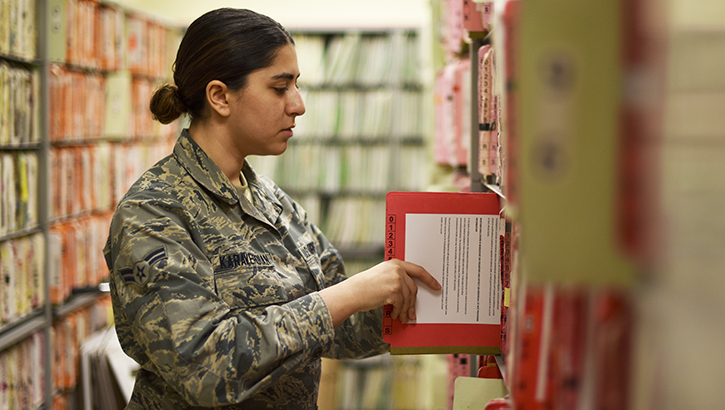
Increased access leads to gains in patient care, outcomes
Modification and Reissuance of DoD Response to Coronavirus Disease 2019 -Travel Restrictions
Publication
4/20/2020
All DoD Service members will stop movement, both internationally and domestically, while this memorandum is in effect. All DoD civilian personnel, and dependents of DoD Service members and DoD civilian personnel, whose travel is Government-funded will stop movement, both internationally and domestically, while this memorandum is in effect.
Chaplains virtually bolster resiliency in the midst of COVID-19
Article
4/20/2020
.ashx?h=68&la=en&mw=120&w=120&hash=DDBD2352E890EA169BE8C49C79DDE1D1E15716AD350448EFD94B3077B60147CA)
The pandemic has charged the team to strengthen the bonds of interaction between itself and the community.
AFMES missions continue through COVID-19
Article
4/17/2020
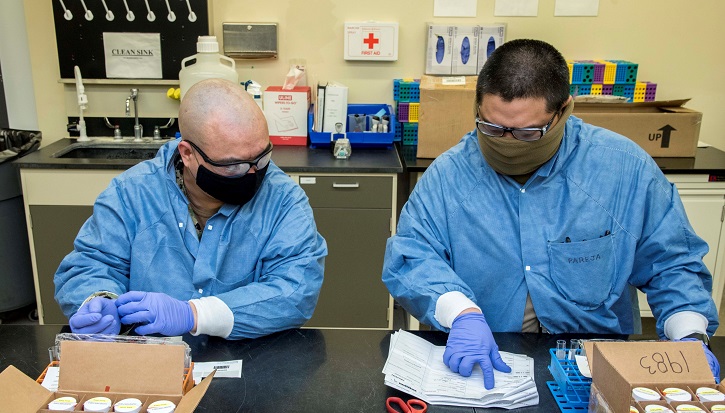
AFMES is a resilient organization that is committed to accomplishing the mission during the global pandemic.
Mobile app may offer hope in times of distress
Article
4/16/2020
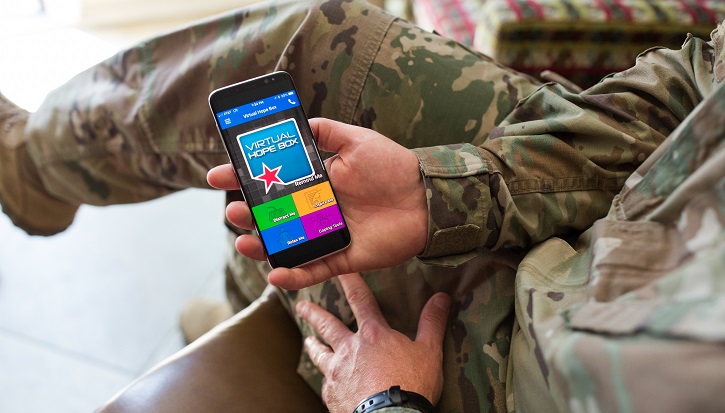
Virtual Hope Box is one mobile app solution that may help individuals cope
Uniformed Services University Adds COVID 19 Training to Curriculum
Article
4/16/2020
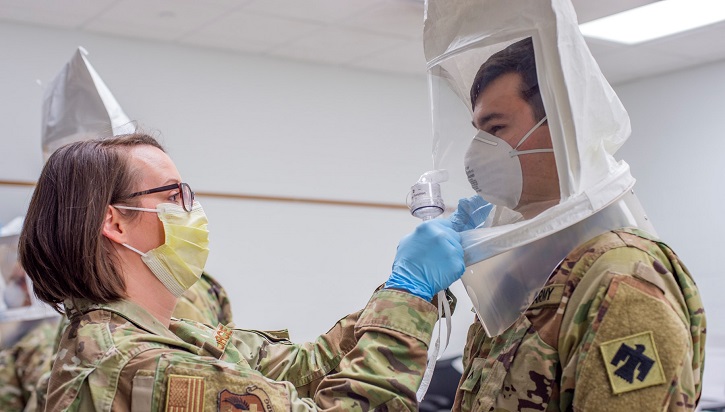
All of the university’s medical school Class of 2020 students completed the training prior to graduating, and the rest of the medical students have until April 15 to finish.
COVID-19 and its impact on healthcare in Europe
Article
4/15/2020
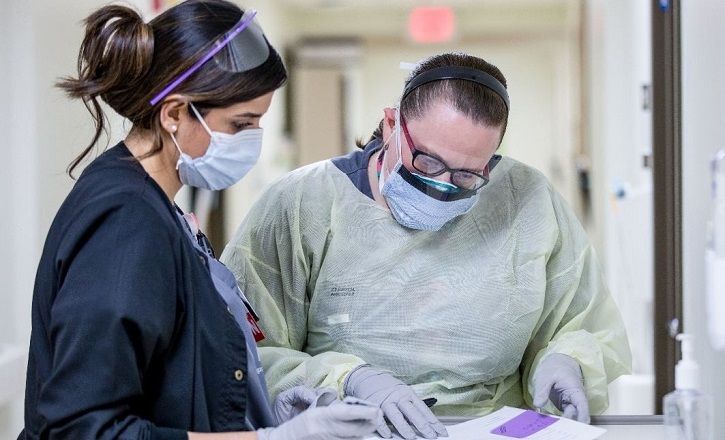
MTF staffs are working hard to meet the needs of beneficiaries across Europe
Memorandum on Providing Federal Support for Governors' Use of the National Guard to Respond to COVID-19
Publication
4/14/2020
Benefits Eligibility for 32 USC 502(f) Missions
Publication
4/14/2020
A chart outlining the various Benefits Eligibility for 32 USC 502(f) Missions
Implementation Guidance for Presidential Memorandum, "Providing Federal Support for Governor's Use of the National Guard to Respond to COVID-19 ," Dated April 7, 2020
Publication
4/14/2020
DoD COVID-19 Practice Management Guide Version 2
Technical Document
4/14/2020
This COVID-19 Practice Management Guide has been rapidly and thoughtfully developed by a multi-specialty group of 60 subject matter experts from across the Department of Defense Military Health System. The intent of this publication is to provide clinicians and military medical treatment facilities (MTFs) with best practices based on latest evidence to optimize DoD response to the current COVID-19 pandemic. This Practice Management Guideline consolidates resources and optimizes the management of patients requiring clinical care during the global COVID-19 pandemic.
Military medical training continues during COVID-19
Article
4/14/2020
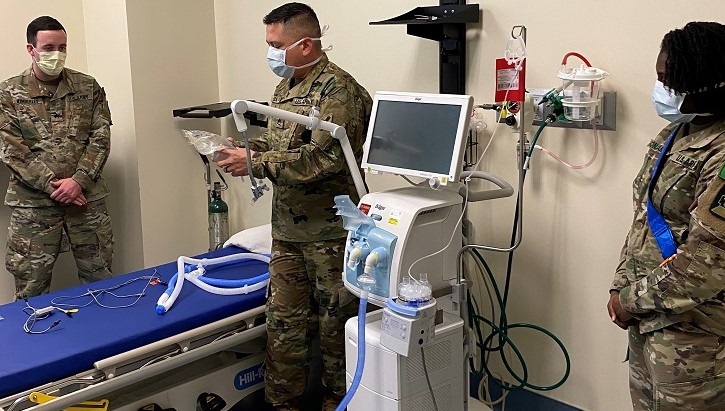
METC’s mission - to train the world's finest medics, corpsmen and technicians - is vital to force readiness and the nation.
Military hospital dials in virtual healthcare to combat COVID-19
Article
4/13/2020
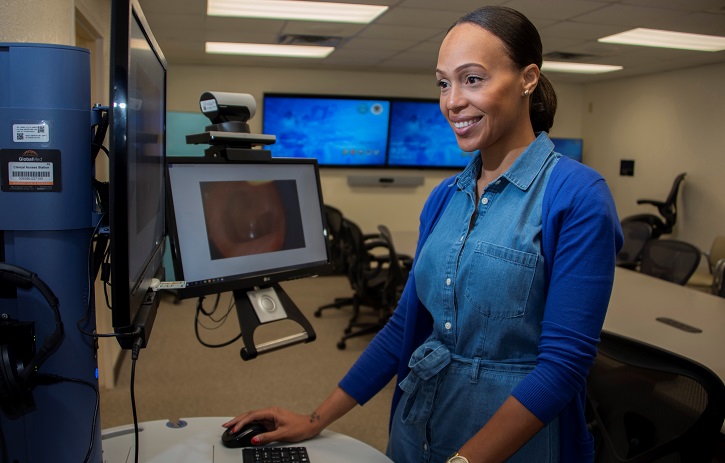
At BAMC, traditional face-to-face appointments for most routine care have increasingly shifted to virtual care to ensure social distancing as well as patient and provider safety.
Stay Home Slide Show
Video
4/10/2020
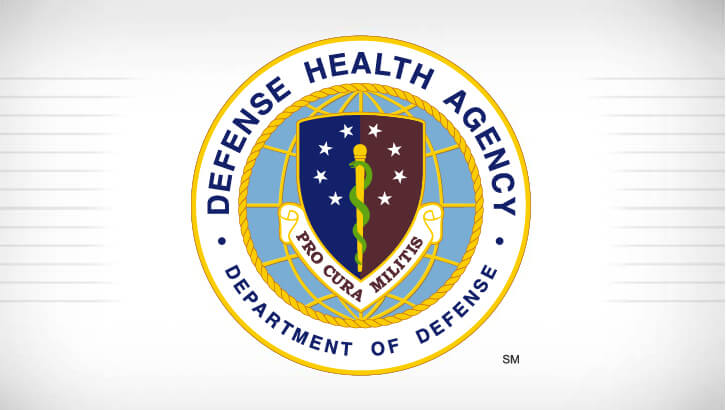
Slide show of photos from BAMC's #stayhome campaign
Delegation of Authority for Reserve Component Activation Authorities during the Coronavirus Disease 2019 Response
Publication
4/10/2020
This delegation assigns to the Service Secretaries the authority to activate Reserve Component personnel and to modify their orders as needed to employ and retain them for the COVID-19 response.































No hay comentarios:
Publicar un comentario